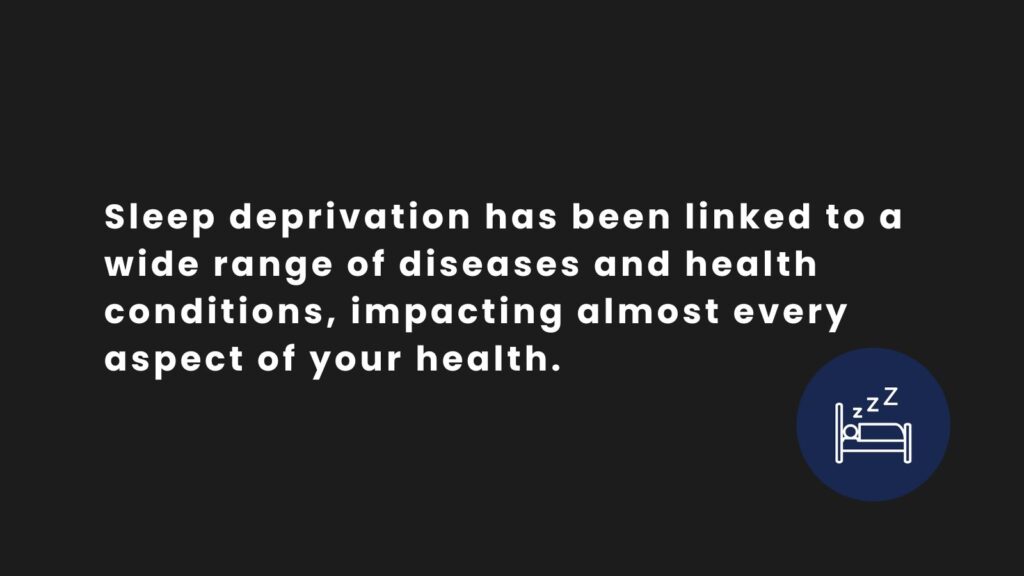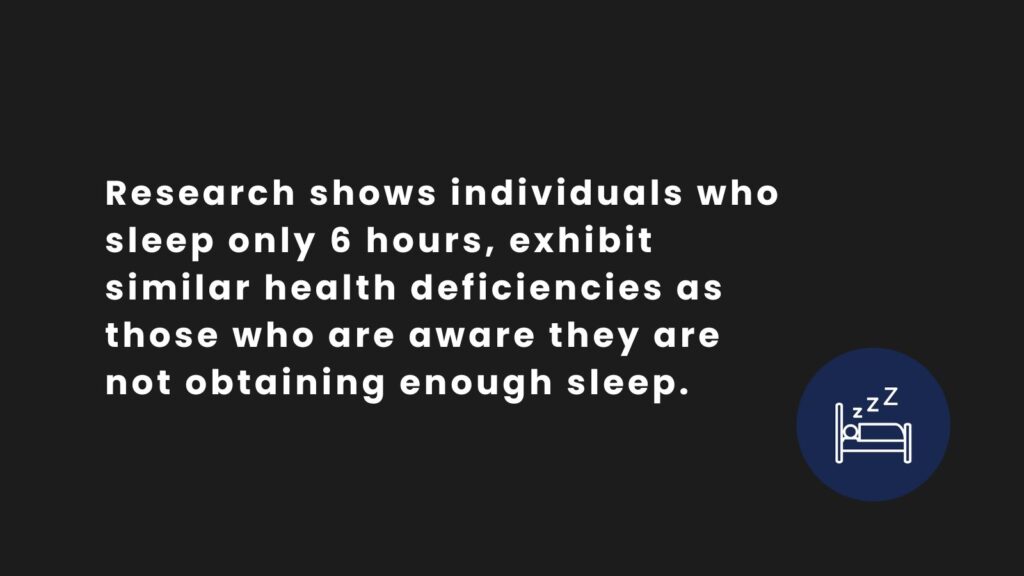Discover the extraordinary power of sleep. Our comprehensive guide unveils its vital role and why it is the number one tool for reaching peak performance in the workplace and how to improve sleep quality.
Sleep: The cornerstone of a healthy and engaged workforce
Sleep is often undervalued in our fast-paced society, yet it is the cornerstone of a healthy, engaged and high-performing workforce.
“The impacts of poor sleep are far-reaching. Insufficient sleep has an estimated economic impact of over $411B each year in the United States alone.”
Throughout this article, we uncover the profound impact sleep has on our bodies, minds, and hormones and how insufficient sleep is a causative factor for disengagement and lost productivity in the workplace.
We also explore:
- The essential components of a consistently good night’s sleep
- The five stages of sleep, highlighting their significance in restoring and rejuvenating our bodies and minds.
- How poor sleep can detrimentally impact brain health, affecting crucial areas such as short-term memory and emotional wellbeing.
The key to navigating the demands of a busy life
Your overall health, vitality, resilience and ability to cope in stressful and demanding situations are intricately tied to the quality of your sleep. When you consistently obtain high-quality sleep, you gift yourself with the essential fuel necessary to navigate the demands of a busy, modern life.
The consequences of poor sleep extend far beyond fatigue. Sleep deprivation has been linked to a wide range of diseases and health conditions, impacting almost every aspect of your body’s delicate balance. Lowered immune function, heightened inflammation, impaired short-term memory, and mood disorders are just a few of the many effects that can manifest from inconsistent poor sleep.

Insufficient or disrupted sleep has been associated with an increased risk of
- Cardiovascular disease
- Diabetes
- Mental health disorders
- Hormone imbalances
- Fertility issues
Disruptions in sleep patterns throw your body’s crucial systems and hormones off-balance, affecting sugar levels, fat metabolism, and hunger control.
How to improve your sleep
Achieving consistently good Sleep encompasses both quantity and quality.
⇒ Learn the secret of boosting brain performance
In order to optimise your sleep routine, it is essential to prioritise both aspects in order to reap the full benefits of restorative slumber.
The Quantity of Sleep Your Body Truly Desires
The golden rule for 80% of the population is 7-9 hours of uninterrupted sleep per night. While individual needs may vary slightly, this range provides your body with ample time to cycle through the essential stages of sleep and promote optimal restoration. By honouring this recommendation, you give your body the opportunity to engage in vital processes such as cell regeneration, hormone regulation, and cognitive consolidation. However, quantity alone is not enough to achieve a good night’s sleep.
Quality Plays an Equally Significant Role in Waking Up Refreshed
One key factor in achieving high-quality sleep is breathing well while asleep. Proper breathing patterns contribute to enhanced oxygen flow, which promotes deeper and more restorative sleep. By paying attention to your breath and adopting healthy breathing habits, you can enhance the quality of your sleep and awaken with a renewed sense of vitality. If you have a known breathing disorder it is crucial you seek professional support.
Why Your 6 Hours of Sleep is Never Enough
Even if you believe you are getting enough sleep with just 6 hours per night, the reality is you are just as likely to perform as badly as those who sleep less than 4 hours. Research consistently shows individuals who consistently sleep for only 6 hours, despite their perception it is sufficient, exhibit similar health deficiencies as those who are aware they are not obtaining enough sleep.

Sleep and optimal brain performance
Each sleep stage plays a unique role in the restoration and rejuvenation occurring during the night.
- Stages 1 and 2 of Sleep – Light Sleep
The initial stages of sleep, Stages 1 and 2, are characterised by light sleep. During this phase, your body begins to relax, and your brain waves slow down. Although you may still be somewhat conscious of your surroundings, your muscles relax, and your breathing becomes more regular.
- Stages 2 & 4 of Sleep – Non-Rapid Eye Movement (NREM) Sleep
As you transition into Stages 3 and 4, also known as Non-Rapid Eye Movement (NREM) sleep, your body enters a profound state of restoration. These stages are often referred to as the body-focused stages, as they play a vital role in removing damaged cells and facilitating tissue repair. It is during this time your body replenishes its energy reserves, stimulates growth and development, and strengthens the immune system. The intricate dance of cellular repair and rebuilding unfolds, ensuring your body is ready to face the challenges of the day ahead.
- Stages 5 of Sleep – Rapid Eye Movement (REM) Sleep
The final stage of sleep, Stage 5 or Rapid Eye Movement (REM) sleep, takes centre stage for dreams and emotional processing. This stage is characterised by heightened brain activity, resembling wakefulness in many aspects. During REM sleep, your brain becomes intensely active, sorting through memories, and processing emotions. It is within the realm of REM sleep your mind weaves dreams, allowing you to make sense of the experiences and emotions you encountered throughout the day.
The quality of your sleep, particularly during these crucial stages, profoundly impacts your brain health. Sleep deprivation or disrupted sleep can lead to downregulation of the hippocampus, a vital region of the brain responsible for short-term memory formation. Consequently, you may experience difficulties with memory recall and cognitive function when deprived of adequate sleep. Additionally, upregulation of the amygdala, another key region of the brain, can occur, resulting in challenges with empathy, mood regulation, and overall mental health.
⇒ Learn the secret of boosting brain performance
How your breathing influences sleep quality
The way you breathe while sleeping impacts the depth and restorative power of your sleep. Poor breathing or disordered breathing during sleep can disrupt your sleep and have unexpected consequences on your health.
One common manifestation is the frequent need to visit the toilet during the night. This phenomenon occurs due to the impact of breathing irregularities on your body’s fluid balance. When your breathing patterns are compromised, it can lead to disturbances in the regulation of fluids, causing an increased need to urinate during sleep.
By addressing and rectifying breathing issues, you can mitigate this disruptive aspect of your sleep and experience more uninterrupted and rejuvenating rest.
By ensuring proper breathing while asleep, you can ensure your body receives an adequate supply of oxygen, facilitating deep and restorative sleep. Proper breathing encourages optimal oxygen exchange, reducing the likelihood of interruptions and enhancing the overall efficiency of your respiratory system.
6 steps for improving your sleep quality and unlocking peak work performance
1. Prioritise your sleep – If you don’t prioritise sleep, it is highly unlikely you will ever be able to feel your best and be your best.
2. Create a consistent sleep routine – A solid sleep routine is the cornerstone of a good night’s sleep. This involves making good choices with food, drink, artificial light, stimulation, noise, temperature, mood, and breathing.
Going to bed at the same time and waking at the same time will assist you in establishing a better sleep routine and good quality sleep.
Preparing for your night’s sleep starts in the morning. What you do during the day will affect your sleep hygiene at night. This includes getting natural light and fresh air throughout the day and exercising, ideally in the morning.
3. Optimise your sleeping environment – Optimise your sleeping environment by taking into account any audible noise, light, temperature and environmental toxins potentially impacting your ability to get to sleep and stay asleep.
4. Mindfully consume before bedtime – Be mindful of your food and liquid (including alcohol) intake before bedtime. Don’t eat dinner 2 hours before bedtime and reduce liquid intake 1 hour before bedtime.
It is important you switch off, both physically and mentally, before a good night’s sleep – no screens 1 hour before bedtime.
While you may feel alcohol helps you get to sleep easier it DOESN’T allow you to get into the deeper, more restorative levels of sleep, which is what makes sleep so important.
5. Sleep on your side – Side sleeping is optimal for a good night’s sleep. It keeps the head, neck, spine, and pelvis well aligned while helping to maintain an open airway.
Stomach sleeping is a problem for muscles of the head, neck and jaw as well as the airway and ack sleeping increases the risk of the lower jaw and tongue falling back and resisting (snoring) or blocking (apnea).
6. Treat disordered breathing – You can use micropore tape if you are a mouth breather or undertaking a sleep study or seeing a specialist for something more serious such as obstructed breathing.
Download: The Unstress ‘Improve Your Sleep’ Practical Toolkit

By recognising the extraordinary power of sleep and taking proactive steps to improve its quality, you are making one of the biggest investments in your health.
Consistent good-quality sleep equips you with the physical, mental, and emotional energy necessary to thrive in today’s busy and modern world.





